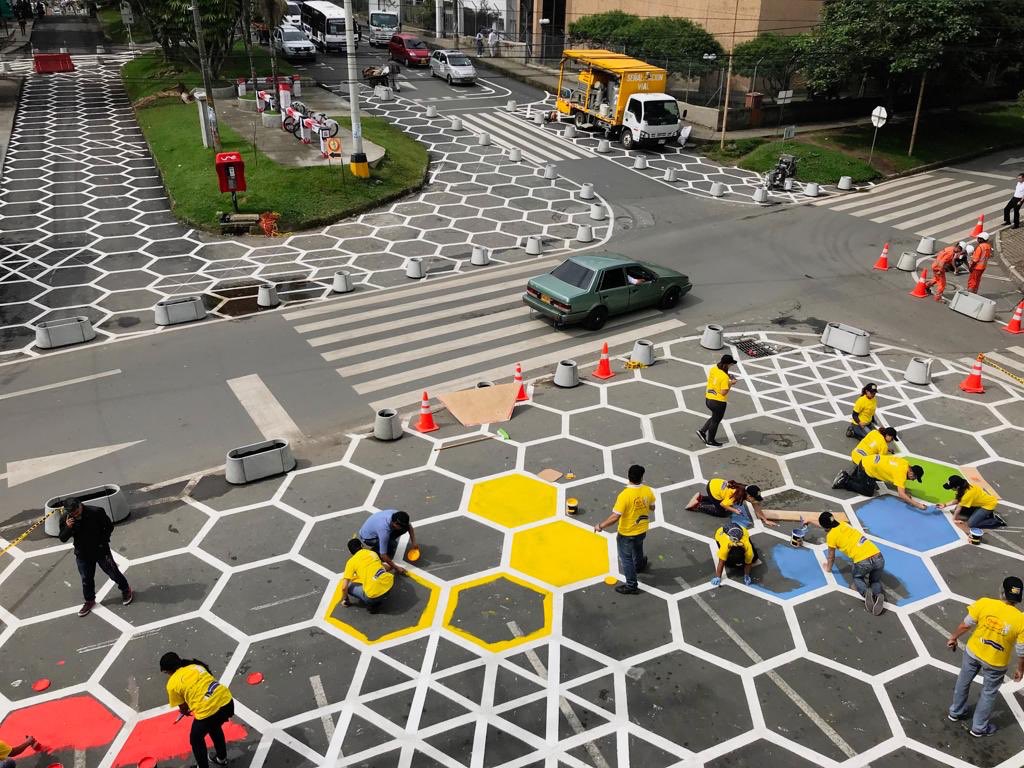Smart Cities
Collectives and Urban Laboratories

Proyecto Rionegro, intersección de calle. Experimento por BID Ciudades.
© Fuente de foto: Tamara EggerThese are spaces for promoting social and urban experiments and innovations.
Often, many of the desired improvement and transformation changes are actually experiments. No matter how good the idea seems and how successful that idea has been in another city, each city faces very particular challenges, and it is not always certain that a project will be well-received by the community or that it will work. The transformation of city models is an entrepreneurial endeavor, and the nature of democracy and governments greatly limits local governments, making it risky to experiment with public resources or unleash citizen opposition.
Smart City Lab Nogales. A project to combat poverty and transform the city through civil society.
Therefore, urban collectives and laboratories can more easily take on these risks to innovate, gaining support from all kinds of organizations that want to see changes, even with the support of the municipality itself.
Urban Community Playas (CUP-Tijuana) is a participatory process coordinated by the ARU in the Playas de Tijuana, BC delegation, where neighbors jointly agree on the improvements they can make to their environment. The Alliance for Urban Regeneration is a non-profit civil association, whose objective is to link and support all the necessary actors of the city (social, academic, private, and public) to implement projects that allow the long-term integral regeneration of underutilized intra-urban neighborhoods in Mexico (financial, social, economic, legal, physical, political solutions...) Source: CUPTijuana.
Types of urban collectives and laboratories:
Real estate entrepreneurs, who seek to transform deteriorated properties or even neighborhoods, as a business or social enterprise, but using real estate and urban innovations.
Events that bring together urban innovators and showcase creative ideas, to raise citizen awareness and begin to open the city's mind to new possibilities. Cities Laboratory of the Inter-American Development Bank, where urban scenarios are experimented with to find solutions to their particular problems.
Activist organizations focused on specific issues, environmental, social, urban, mobility, public spaces, economic development, among others. Among these, organizations dedicated to promoting bicycles tend to be among the best allies and advocates of urban innovation.
Case study
Biciudad, Guatemala + El Salvador
Biciudad is a combination of NGO and social enterprise, an organizational innovation applied to sustainable mobility, whose objective is to promote safety and infrastructure conditions, as well as raising awareness among the population, especially young people, to promote the bicycle as a means of transportation in Guatemala and El Salvador.
Since 2012, they have been managing projects that seek to create a "bicycle culture" among the population, as well as the generation of public policies and cycle-inclusive infrastructure in cities, with initiatives such as film cycles, art exhibitions, photography contests, Biciferias, and awareness-raising tours.
In countries accustomed to a lack of collaboration, Biciudad has managed to unite institutions, civil society, and companies in mobility projects, generating a sense of community. Biciudad works in collaboration with various collectives, NGOs, and municipalities.
